| Srl | Item |
| 1 |
ID:
109478
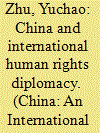

|
|
|
|
|
| Publication |
2011.
|
| Summary/Abstract |
China has developed a multi-tier strategy in its human rights diplomacy. It has three aspects: in the multilateral international human rights arena, China's approach is dominated by the sovereignty principle and organising like-minded countries into a coalition; in bilateral diplomatic channels, China follows a combined policy of dialogue, negotiation, bargaining and supplementary economic incentives; and on certain international human rights issues such as in the case of Darfur, China mainly applies ad hoc and flexible policies. The core of China's approach is to protect its sovereignty as it continues to insist that human rights are a domestic matter. However, it is becoming increasingly difficult to maintain this rigid position. China must adjust its practice to conform to the international norms.
|
|
|
|
|
|
|
|
|
|
|
|
|
|
|
|
| 2 |
ID:
072622
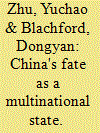

|
|
|
|
|
| Publication |
2006.
|
| Summary/Abstract |
After the collapse of the two communist multinational states, the Soviet Union and Yugoslavia, the fact that China survives as the only communist multinational state poses an interesting question: why does China remain intact and how long will it be able to survive in its present state? This paper tries to address these questions. The analysis is centred on three areas: the formation and characteristics of China's ethnic minorities and their role in this multinational state; the relevant domestic politics including institution building and polices; and the influence of external conditions such as international law and realpolitik. The preliminary finding is that in fact only two minority groups in two regions, Tibetans in Tibet and Uygurs in Xinjiang, have the real potential of secession, but it is very unlikely that China as a multinational state will disintegrate in the near future because the internal environment and international politics do not constitute adequate conditions for that to happen.
|
|
|
|
|
|
|
|
|
|
|
|
|
|
|
|
| 3 |
ID:
114650
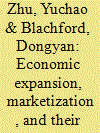

|
|
|
|
|
| Publication |
2012.
|
| Summary/Abstract |
Through a discussion of migration and employment situations in Xinjiang and
Tibet, this paper critically examines the social impact of China's recent economic
expansion and dynamic marketization on its ethnic minorities in the minority
regions of Xinjiang and Tibet.
|
|
|
|
|
|
|
|
|
|
|
|
|
|
|
|
| 4 |
ID:
068845
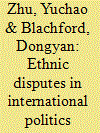

|
|
|
| 5 |
ID:
064687
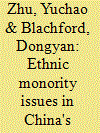

|
|
|
| 6 |
ID:
143770
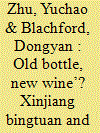

|
|
|
|
|
| Summary/Abstract |
Xinjiang Production and Construction Corps (Xinjiang Shengchan Jianshe Bingtuan—shortened form Bingtuan) is a distinctive military agricultural settlement and production institution in China’s western region, Xinjiang. It is also a modern form of China’s traditional ethnic frontier governing mechanism. This article discusses Bingtuan’s historical precedents, modern development and innovative change for Xinjiang governance. In an examination of Bingtuan’s main functions for China’s ethnic frontier governance, this article argues that in addition to economic sustainability and territorial security, Bingtuan played an important but multifaceted role in ethnic relations in Xinjiang, such as territorial fragmentation, ethnic separation and redefinition of regional identity; therefore Bingtuan not only makes its administrated area China’s ‘frontier of settlement’ but also acts as a key state agency for whatever future Xinjiang might have.
|
|
|
|
|
|
|
|
|
|
|
|
|
|
|
|